Do you wake up at night with an urgent need to urinate? We understand how frustrating it is to have constant interruptions and discomfort from benign prostatic hyperplasia (BPH).
We are here to help you find relief and reclaim your peace. With our deep expertise in managing BPH symptoms, we offer solutions that truly work, such as Cialis for BPH.
Cialis is an oral medication that helps relax the muscles and increase blood flow to the penis, prostate, and bladder, allowing urine to flow more freely.
Next, we explore Cialis treatment for BPH, its impact on urinary and sexual health, and potential side effects.
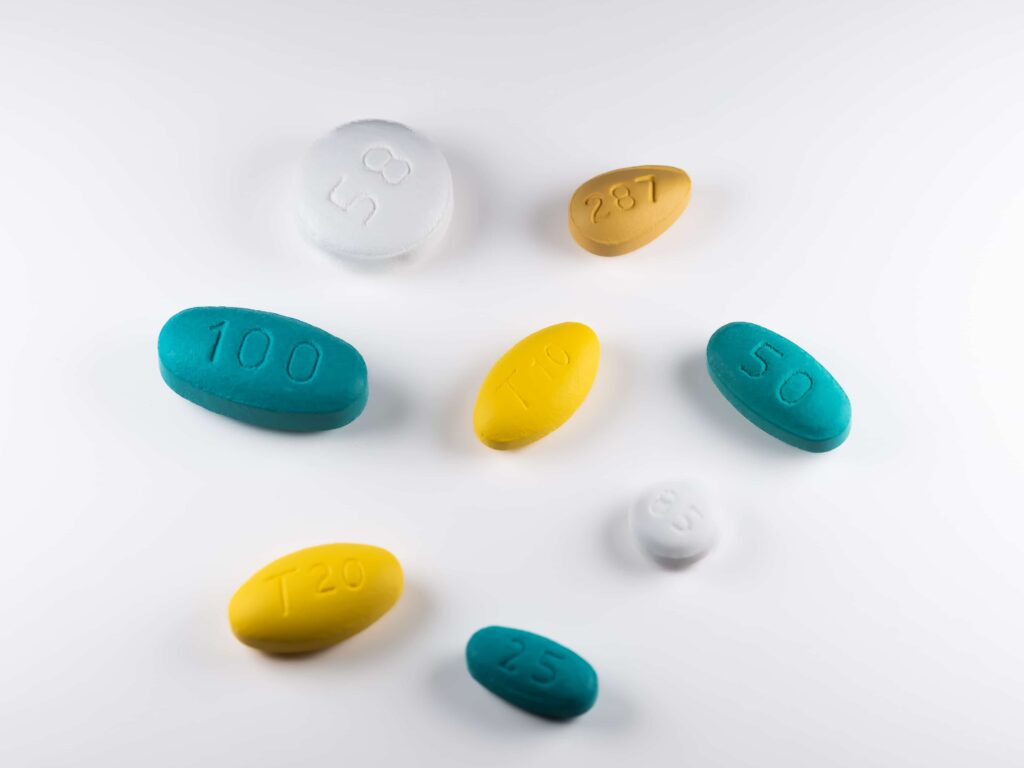
Understanding BPH
BPH is characterized by an enlarged prostate, which can range in severity. It is usually caused by natural aging and hormonal changes, but other BPH causes include cell growth, inflammation, and lifestyle or neurological factors.
Some men experience mild BPH symptoms that are easily managed with lifestyle changes, such as:
- Modifying your diet.
- Managing your fluid intake.
- Following a set urination schedule.
For others, further medical intervention is necessary for symptom relief. Talk to your healthcare provider, as they may recommend medications, like Cialis that may offer relief.
Cialis for BPH
Cialis (generic name tadafil) was originally developed to help men living with erectile dysfunction.
However, it was FDA-approved in 2011 for BPH treatment after studies1 revealed a once-daily Cialis for BPH dosage helped relieve lower urinary tract symptoms (LUTS) when given over a 12-week period.
Researchers tested several Cialis daily dosage levels, including 5, 10, and 20mg. They concluded that a low dose of Cialis for BPH (a 5 mg daily) delivered maximum relief with minimal side effects.
Cialis Impact on Urinary Symptoms
Cialis works by increasing levels of cGMP (cyclic guanosine monophosphate) in the body—a key player in the bodily processes (e.g., blood flow to the penis and muscle relaxation in the prostate and bladder) crucial for treating BPH.
Initially developed to enhance sexual function, studies2 have demonstrated its effectiveness in improving urine flow by promoting prostate relaxation.
Additionally, Cialis reduces nighttime urination frequency, offering daily relief from symptoms.
What is the best time of day to take Cialis for BPH? Taking Cialis once daily can significantly alleviate symptom burden. While you can take this medication any time of day, you should try to take it at the same time every day.
Cialis Impact on Sexual Function
Cialis enhances the release of a key chemical during sexual arousal, increasing blood flow to the penis. This helps you achieve and sustain an erection, facilitating sexual intercourse. Its effects can last for 36 hours after taking the medication, offering greater spontaneity in sexual activity for many men.
Potential Side Effects of Cialis
For most men, Cialis causes only mild side effects, including:
- Headaches
- Nausea
- Diarrhea
- Indigestion
- Back and muscle pain
- Stuffy nose
- Facial flushing
However, it can also cause a sudden and potentially dangerous drop in blood pressure. Therefore, men taking nitrates or other blood-pressure-lowering medications should not take Cialis.
Quality of Life and Patient Satisfaction Post-Treatment
Cialis can improve your quality of life by relieving the painful, frustrating, and uncomfortable urinary symptoms of BPH.
However, if you cannot take Cialis for BPH, or it doesn’t provide sufficient relief, you still have non-surgical options.
At Georgia Prostate Institute, our interventional radiologists offer Prostate Artery Embolization (PAE), a minimally invasive procedure that helps alleviate lower urinary tract symptoms associated with BPH. PAE avoids large incisions and general anesthesia, reducing the risks and recovery time of traditional prostate surgery.
Are you interested in PAE treatment? Request a consultation with our prostate specialists in Georgia today to explore your options.
References:
- Claus G. Roehrborn, Kevin T. mcVary, Albert Elion-Mboussa, and Lars Viktrup. 2008, October 1). Tadalafil Administered One Daily for Lower Urinary Tract Symptoms Secondary to Benign Prostatic Hyperplasia: A Dose Finding Study. https://www.auajournals.org/article/S0022-5347(08)01715-1/fulltext
- Konstantinos Hatzimouratidis. (2014, August). A review of the use of tadalafil in the treatment of benign prostatic hyperplasia in men with and without erectile dysfunction. https://www.ncbi.nlm.nih.gov/pmc/articles/PMC4054509/
Experiencing blood in your urine can be unsettling and alarming, especially when you’re already dealing with the challenges of benign prostatic hyperplasia (BPH).
We understand how concerning this can be and are here to help. At Georgia Prostate Institute, our skilled physicians and clinical staff have the expertise you need to address this issue so you can feel better fast.
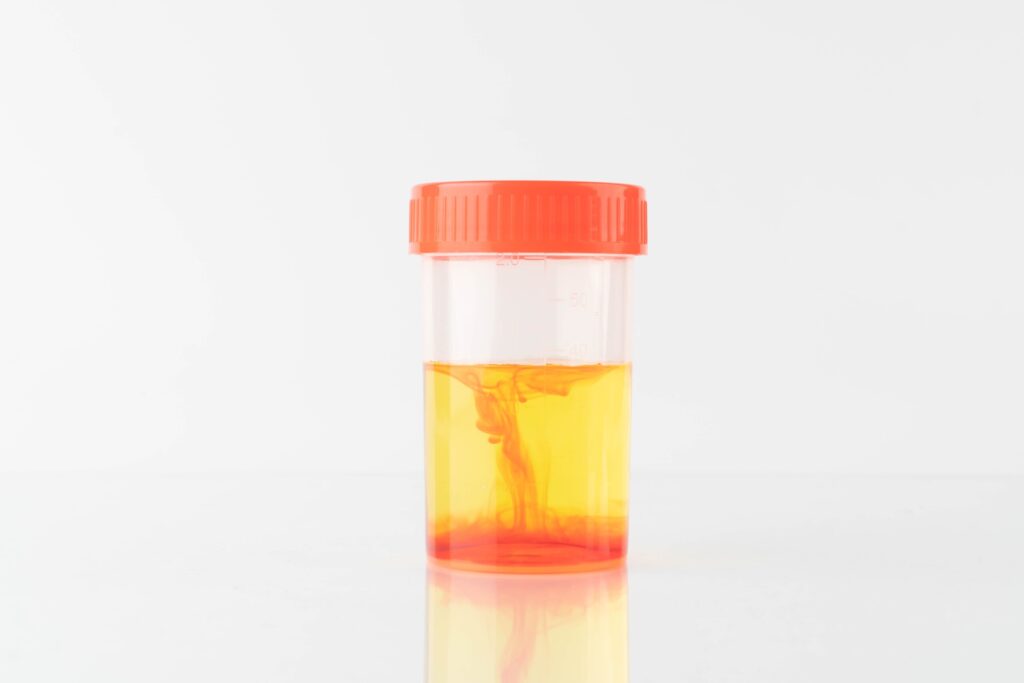
Benign prostatic hyperplasia (BPH) is a condition characterized by an enlarged prostate gland. This condition can often lead to uncomfortable symptoms involving the lower urinary tract. But can BPH cause blood in urine? Let’s explore the connection between BPH and blood in the urine and how we can help you get the proper treatment.
Understanding BPH
BPH is a condition in which your prostate gland is enlarged, but not due to cancer.
There are several BPH causes, including:
- Hormonal changes: often related to the aging process in men.
- Lifestyle factors like diet and physical activity.
- Family history
- Other factors and environmental influences.
As the prostate grows, it can exert pressure on the urethra and bladder, putting pressure on both structures and impacting the way you urinate.
For most men, BPH symptoms are characterized by the way your urine flows—concerns include:
- Urgency: A sudden and frequent need to urinate.
- Flow: Difficulty stopping or starting urine flow.
In some cases, BPH can lead to hematuria or blood in the urine. This often occurs when BPH is left untreated for some time, leading to more serious symptoms and complications.
What Is Hematuria?
Hematuria is the medical term describing the presence of blood in your urine.
There are two types of hematuria:
- Gross hematuria
This is when blood is visible in the urine to the naked eye, giving it a pink, red, or brown color. - Microscopic hematuria
This is when blood is present in the urine but only detectable through a microscope or urine test.
Typically, hematuria isn’t painful, but it can be a sign of various underlying conditions, like BPH. If you notice blood in your urine, consult a healthcare provider right away for proper diagnosis and treatment.
Hematuria as a Symptom of BPH
Can BPH cause blood in urine?
A study from the National Library of Medicine confirms that blood in the urine is a symptom of an enlarged prostate, often due to vascular changes that occur with glandular growth or even following transurethral resection of the prostate (TURP). TURP is a surgical treatment option that removes some of your prostate tissue to improve urine flow.
But can BPH cause blood clots in urine?
Yes, although it‘s less common than BPH hematuria. When the prostate enlarges, the blood vessels inside can also expand. In some cases, these vessels may burst, resulting in bleeding (and blood in the urine). If this bleeding goes unchecked, it can lead to blood clots, which will then be expelled through urination.
Other Conditions and Factors Related to Hematuria BPH
Blood in your urine is often a secondary symptom of untreated BPH. While BPH-related hematuria is often not a medical emergency, it’s important to get a prompt diagnosis.
However, hematuria can also be a sign of other, more serious conditions, such as:
- Kidney injury
- Kidney disease
- Urinary tract infection
- Sickle cell anemia
- Alport syndrome
- Bladder, kidney, or prostate cancer.
Certain medications can also lead to hematuria, especially those meant to prevent clotting in your blood.
Because there are many potential causes of blood in your urine, it’s crucial to see your doctor as soon as you notice signs of hematuria. An accurate diagnosis is essential for determining the underlying cause and starting appropriate treatment.
Diagnosis and Treatment
When you visit your healthcare provider for hematuria, they may perform a physical exam and several diagnostic tests to determine what’s causing it. These may include:
- Urine test
- Ultrasound
- CT or MRI scans,
- Cystoscopy (a tiny, camera-equipped tube inserted into the bladder)
Once they determine the cause, they can start treatment, helping you find relief from this worrying symptom.
Managing BPH and Preventing Hematuria
If BPH is causing blood in your urine, effectively managing your condition is key to preventing further episodes.
There are many BPH treatment options, and the best choice for you will depend on the severity of your condition, along with your personal preference.
Many men find relief through lifestyle modifications or medication. However, if these methods aren’t enough and you want to avoid surgery, we encourage you to consider Prostate Artery Embolization (PAE) at Georgia Prostate Institute.
Request a consultation today to take control of your health, find relief, and improve your quality of life.
References:
Claus G. Roehrborn, Kevin T. McVary, Albert Elion-Mboussa, and Lars Viktrup. 2008, October 1). Tadalafil Administered One Daily for Lower Urinary Tract Symptoms Secondary to Benign Prostatic Hyperplasia: A Dose Finding Study. https://www.auajournals.org/article/S0022-5347(08)01715-1/fulltext
Urinary incontinence (IU) and benign prostatic hyperplasia (BPH) are two common urogenital problems in men aged 45 and older.
If you have an enlarged prostate due to benign prostatic hyperplasia (BPH), you may experience uncomfortable or embarrassing lower urinary tract symptoms (LUTS) like urge or urinary incontinence.
But what is it, what causes it, how can you manage it, and what are effective BPH incontinence treatment options? Below, we share everything you need to know about managing BPH and incontinence.
What Is BPH?
Benign prostatic hyperplasia (BPH) is a noncancerous enlargement of the prostate gland. It can cause symptoms like difficulty starting urination, a weak urine stream, and the need to urinate frequently (especially at night).
The good news is it is treatable.
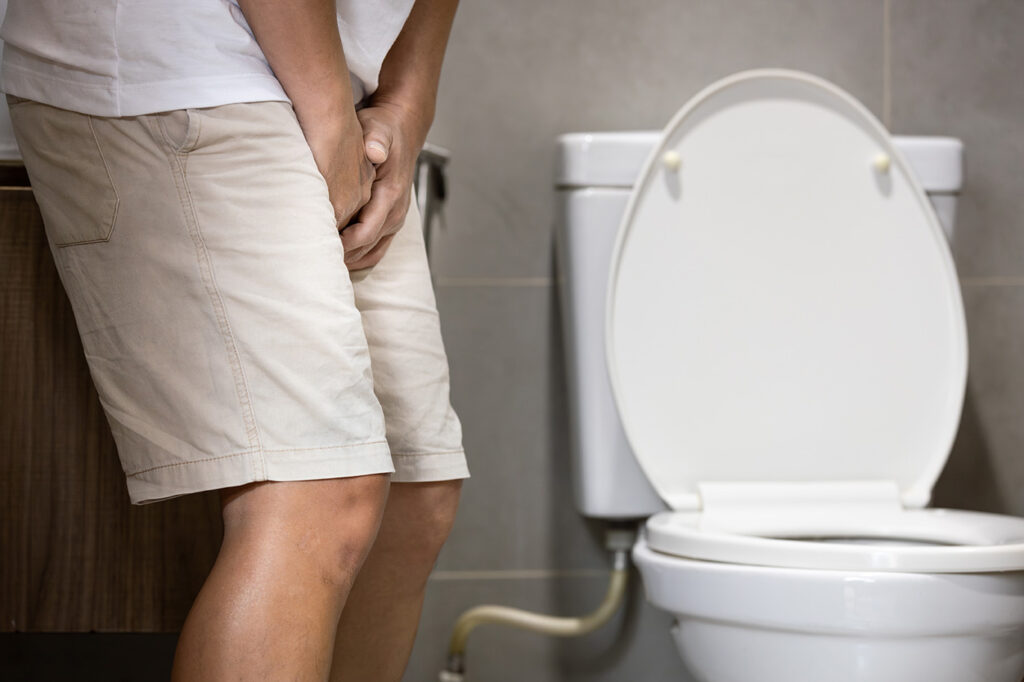
What Is Urinary Incontinence?
Urinary incontinence is a loss of bladder control, resulting in accidental and unintentional urine leakage.
It is a common and treatable symptom of BPH.
What Causes BPH and Urinary Incontinence?
When your urinary tract functions optimally, your brain tell you to use the restroom when your bladder is partially filled. This advance warning ensures plenty of time to make it to the restroom. During urination, your urinary sphincter valve opens, and your bladder wall muscles contract, allowing your body to empty the bladder.
However, when you have BPH symptoms like incontinence, the system may break down for a variety of reasons.
BPH incontinence can cause issues such as:
- Overflow incontinence—Unexpected urine leakage from an overly full bladder.
- Urge incontinence—Sudden and unexpected urge to urinate, often resulting in leakage.
- Overactivity incontinence—Increase in urination urgency and frequency.
- Post-void dribbling—Prolonged urine leakage after the main urine flow has stopped.
Enlarged Prostate and Incontinence: Managing the Urges
Before seeking medical intervention for BPH incontinence, many men prefer to start with lifestyle interventions. These adjustments can help reduce urge incontinence and the risk of accidents before reaching the bathroom. Here are some suggestions to help manage incontinence due to BPH:
- Avoid or limit irritating food and drinks (e.g., caffeine, alcohol, spicy foods, acidic foods)—Reduce bladder irritation and decrease the risk of sudden bladder spasms.
- Stay hydrated and active—Increase your water intake and engage in regular physical activity to support optimal bladder function. Staying well-hydrated helps dilute urine, reducing the concentration of substances that can irritate the bladder lining. It can also lower your risk for bladder infections and kidney stones. Regular exercise can help strengthen pelvic floor muscles and improve bladder function.
- Schedule regular bathroom visits—Establish a routine for regular bathroom breaks to prevent your bladder from becoming too full.
- Limit liquids before outings—Avoid unexpected urge incontinence while on the go.
- Ask your doctor about bladder muscle exercises—Certain exercises may help strengthen bladder muscles, helping you retain urine and manage incontinence more effectively.
- Ask your doctor about medications—Certain medications can help reduce urge incontinence. However it’s important to note they may cause unintended side effects and will not address the underlying cause of BPH or incontinence.
While these lifestyle measures can successfully reduce the daily impact of an overactive bladder, lasting relief for BPH incontinence can only be found by treating the enlarged prostate itself. Many men are discovering the benefits of PAE (Prostatic Artery Embolization) treatment for BPH.
What Is PAE?
PAE (prostate artery embolization) is a minimally invasive, non-surgical, interventional radiology procedure that provides effective enlarged prostate and incontinence treatment. PAE works by blocking the blood supply to specific areas of the prostate, causing those areas to shrink and relieve pressure on the urethra and bladder.
Treating BPH Incontinence With PAE
During the PAE procedure, our prostate specialists introduce embolic agents into the arteries that deliver blood supply to your enlarged prostate gland. This is achieved by inserting a small, narrow catheter into your body through a small incision is made near the groin. Guided by X-ray imaging, we can direct the catheter to target those arteries.
Once positioned properly, we can inject the catheter with an agent containing microscopic beads. These beads effectively block blood flow to the prostate, starving the gland of its nutrition and causing significant shrinking. As your prostate gland reduces in size, you will experience significant symptom relief. BPH incontinence should no longer be a major concern.
Our interventional radiologists perform PAE as an outpatient procedure, so you don’t have to worry about general anesthesia or overnight hospital stays. Plus, PAE is completed in about two hours, meaning most patients will go home on the same day as the procedure.
Following treatment, your recovery period should pass quickly. Most men who undergo PAE for BPH incontinence can resume regular activities within a week of their procedure.
Safe, Effective Enlarged Prostate and Incontinence Treatment at Georgia Prostate Institute
Tired of being tied to the bathroom? Ready to find relief for incontinence and BPH?
We’re here to help. Request a consultation at the Georgia Prostate Institute today and begin your journey to urinary relief.
Benign prostatic hyperplasia (BPH), or an enlarged prostate, is a common condition affecting millions of men worldwide, particularly those over 60. Living with BPH can significantly impact daily life, especially as the condition worsens.
In this article, we’ll help you understand what BPH is, the connection between BPH and kidney health, its associated risks and complications, and how to protect yourself from an enlarged prostate and kidney issues.
What Is BPH?
BPH is a non-cancerous enlargement of the prostate gland—a small, walnut-shaped male reproductive organ located between the bladder and penis.
Because your urethra (the tube that carries urine from your bladder to your penis) passes through the middle of your prostate, prostate enlargement may cause one or more BPH symptoms, such as:
- Difficulty starting or controlling urine flow.
- Weakened urine flow.
- Frequent urination.
An enlarged prostate may also increase your risk for more serious kidney issues.
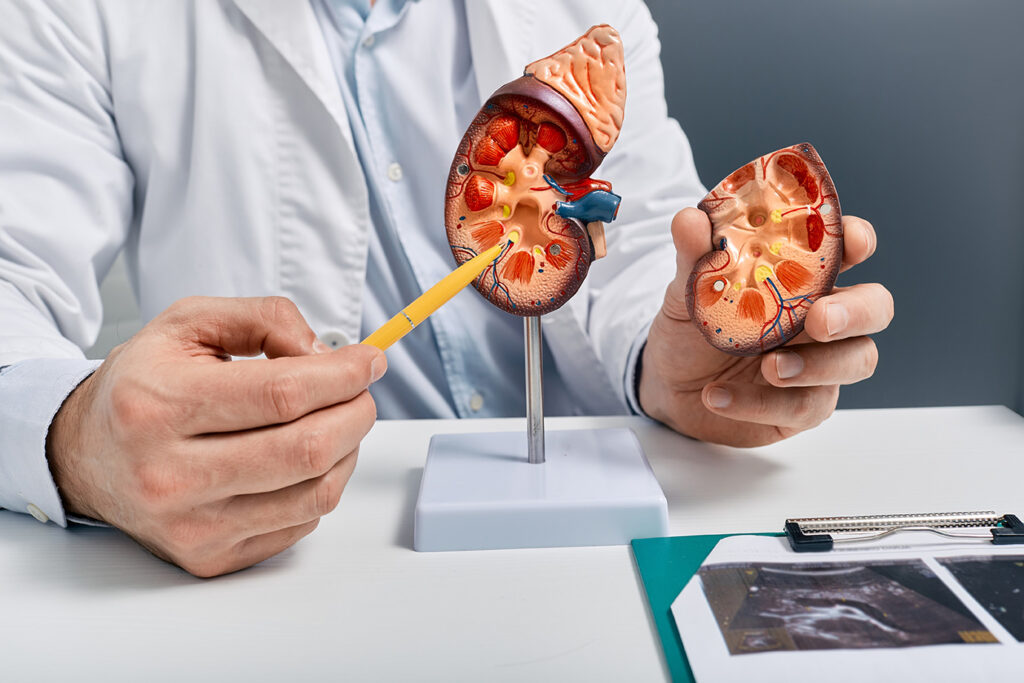
Enlarged Prostate and Kidney Issues: What Are the Risks?
Men with BPH who have trouble emptying their bladder or extended periods of urinary obstruction have a higher risk of the following urinary tract, bladder, and kidney issues:
- Difficulty urinating.
- Reduced urinary flow.
- Difficulties completely emptying your bladder with urination.
- Losing the ability to pass any urine.
- Frequent urinary tract infections (UTIs).
- Urinary tract stones.
Can an Enlarged Prostate Cause Kidney Problems?
As urinary and bladder symptoms become severe, the following kidney problems can occur:
- Kidney damage or infections.
- Hydronephrosis (kidney swelling).
- Kidney stones.
- Chronic kidney disease.
- Renal failure (in severe cases, if left untreated).
Seek BPH treatment at the first sign of urinary difficulties to stay safe and protect your long-term kidney health. Next, we explore factors that can increase your risk for kidney issues.
What Increases My Risk for Enlarged Prostate and Kidney Issues?
If you have one or more of the following health conditions, you have a higher risk of developing kidney issues:
- Hypertension (high blood pressure).
- Diabetes.
- Obesity.
- Metabolic syndrome.
- Cardiovascular disease.
- Sedentary lifestyle.
- Family history of enlarged prostate and kidney disease.
Ask your doctor about ways to lower your risk for BPH and kidney disease. If you ignore the warning signs of BPH puts you at risk for kidney failure.
What Is Kidney Failure?
Kidney failure, or renal failure, is a critical condition that occurs when the kidneys lose their ability to effectively remove waste products from the blood. This leads to a dangerous buildup of toxins in the body, disrupting normal bodily functions and causing illness. While acute kidney failure can often be reversed with proper treatment, chronic kidney failure may require regular dialysis or a kidney transplant to sustain life.
Signs of Kidney Failure
Symptoms of an enlarged prostate and kidney failure may begin slowly but will progress in severity. Warning signs of serious kidney damage include:
- Nausea
- Fatigue
- Swollen feet, legs, or ankles
- High blood pressure
- Reduced urine output
- Blood in the urine
- Back and flank pain
- Chest pain
- Shortness of breath
- Mental confusion
- Seizures
- Coma or even death
Recognizing these warning signs and seeking prompt medical attention can help you prevent further complications and manage the condition effectively.
How Can I Protect My Kidney Health?
Maintain a Healthy Diet
Depending on the severity of your symptoms, you may be able to treat your BPH with simple diet and lifestyle adjustments. For example, you can help lower your symptom burden by following a diet that’s rich in fiber, fruits, and vegetables and avoiding dietary triggers such as:
- Caffeine
- Alcohol
- Spicy foods
- Sodium-rich foods
- Sugar-rich foods
- Fried or fatty foods
Certain supplements for prostate health may also help. Talk to your doctor to find out if prostate supplements are right for you.
Maintain a Regular Bathroom and Exercise Schedule
In some cases, you can reduce the health impact of an enlarged prostate by scheduling regular bathroom breaks and using the restroom as soon as you experience an urge to urinate. Regular exercise and stress management can also help manage BPH symptoms.
However, men whose symptoms are not well controlled through diet and lifestyle changes will need to seek medical treatment to avoid developing serious kidney issues.
Expert Treatment for Enlarged Prostate and Kidney Issues at Georgia Prostate Institute
Find out how to protect your kidneys and address BPH without surgery at Georgia Prostate Institute.
We can help you determine whether prostate artery embolization (PAE) is right for you. This research-backed treatment provides relief to symptomatic patients whose health or preference prevents them from undergoing invasive surgical procedures.
PAE can also help men improve sexual function while reducing their risk for kidney disease.
Wondering if you’re a candidate for PAE in Georgia? Request a consultation today. During your initial visit, we’ll review your treatment options and help protect your long-term kidney health.
Benign Prostatic Hyperplasia (BPH, or an enlarged prostate) is a condition that often develops with age. While we don't know exactly why you may develop this condition, we do know that supporting your prostate health could help prevent symptoms like urgent urination or waking in the night to pee. But can drinking tea for prostate health prevent BPH? Check out the science on this topic, below.

Green Tea for Prostate: What the Research Says
There are several studies that suggest drinking green tea could help prevent prostate cancer. But BPH is not a cancerous condition. And this study examining the effects of green tea on Prostate-Specific antigens (PSA levels, which can indicate BPH if elevated), they discovered that sipping this tea didn't lead to a noticeable change in their levels.
Even worse? Men who already have BPH could experience worsening symptoms if they drink caffeinated beverages such as black and green tea. So, for that reason, you should not turn to tea for prostate health support. But, if you want to boost your prostate health with diet, check out some winners and losers below.
Lifestyle Measures for BPH
Men who have an enlarged prostate can try incorporating more vegetables and fruits into their diets. You can also turn to high fiber options like oatmeal or brown rice. And add more lean proteins such as chicken breasts and salmon.
Also, while you should steer clear of tea for prostate health, you should also drink more water to help relieve BPH symptoms. You could even add fruit-smoothies to your menu for nutrient-rich liquids.
Finally, you also need to eliminate certain foods from your diet, including red meat, dairy products, spicy foods and foods with elevated sodium levels. Then, if lifestyle measures don’t offer sufficient BPH symptom relief, you can turn to our experts at the Georgia Prostate Institute.
Relieve BPH without Surgery
If you drink tea for your prostate health, you won’t relieve your BPH symptoms; instead, you just might make them worse. Suffering from the lower urinary tract symptoms (LUTS) of an enlarged prostate? Why not consider PAE (prostatic artery embolization). This is a minimally-invasive, non-surgical procedure that relieves BPH symptoms without putting you at risk for erectile dysfunction or incontinence. And it does so without the need for overnight hospital stays or general anesthesia. Wondering if you’re a candidate for PAE in Georgia? Click here to request a consultation today.
If you have an enlarged prostate because of benign prostatic hyperplasia (BPH), your condition is not cancerous. However, if you have prostate cancer, your prostate may still be enlarged, causing the same disruptive lower urinary tract symptoms (LUTS) that men with BPH experience. For that reason, Moffitt Cancer Center experts reveal that having PAE treatment for prostate enlargement before you have radiation for prostate cancer may ease your experience.
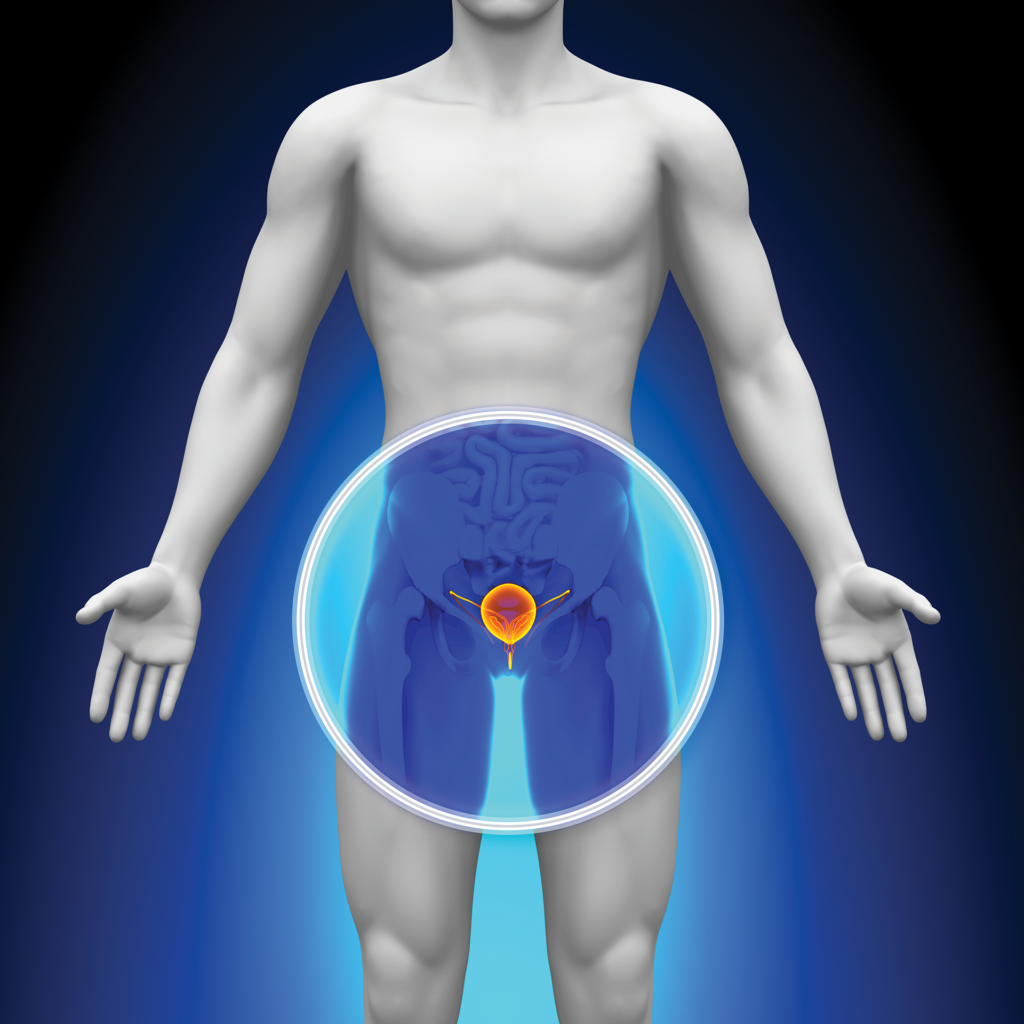
What is Prostate Artery Embolization?
Prostatic artery embolization, or PAE, is a medical procedure that reduces blood flow to the artery feeding your prostate. Performed non-surgically, this procedure involves depositing embolic materials in your artery. And our interventional radiologists are able to deposit them there through a catheter that' guided into place by x-ray imaging.
Now, for men with BPH, undergoing PAE treatment for prostate enlargement can provide fast relief from symptoms such as urinary urgency and waking in the night to pass urine. Better yet, it provides relief without the need for surgery or overnight hospital stays, all with a far lower risk of sexual side effects or other serious complications. And now, it turns out that men with prostate cancer may also benefit from undergoing PAE treatment prior to beginning radiation therapy.
Before Cancer Therapy, Consider PAE Treatment for Prostate Prior
Interventional radiologist Dr. Nainesh Parikh, assistant chief medical officer at Moffitt Cancer Center, says patients who have PAE before undergoing radiation for prostate cancer could shorten the course of their treatment. Plus, their LUTS symptoms should improve while their prostate size reduces, potentially reducing the number of radiation treatments needed. He also expressed to the BackTable Podcast that, in the future, men receiving other forms of treatment for prostate cancer, along with men experiencing prostatitis or chronic pelvic pain after radiation therapy, may also benefit from PAE.
Choosing PAE in Georgia
If you have BPH or prostate cancer, you can choose this medical procedure for symptom relief and to non-surgically shrink your prostate. Want to see if you're a candidate for PAE? Click here to request an appointment at the Georgia Prostate Institute today!
Many men with enlarged prostates worry about cancer. And when King Charles entered the hospital to treat his BPH, only to get released with a cancer diagnosis, that didn't help matters. However, for most men, an enlarged prostate and cancer are two completely separate diagnoses.
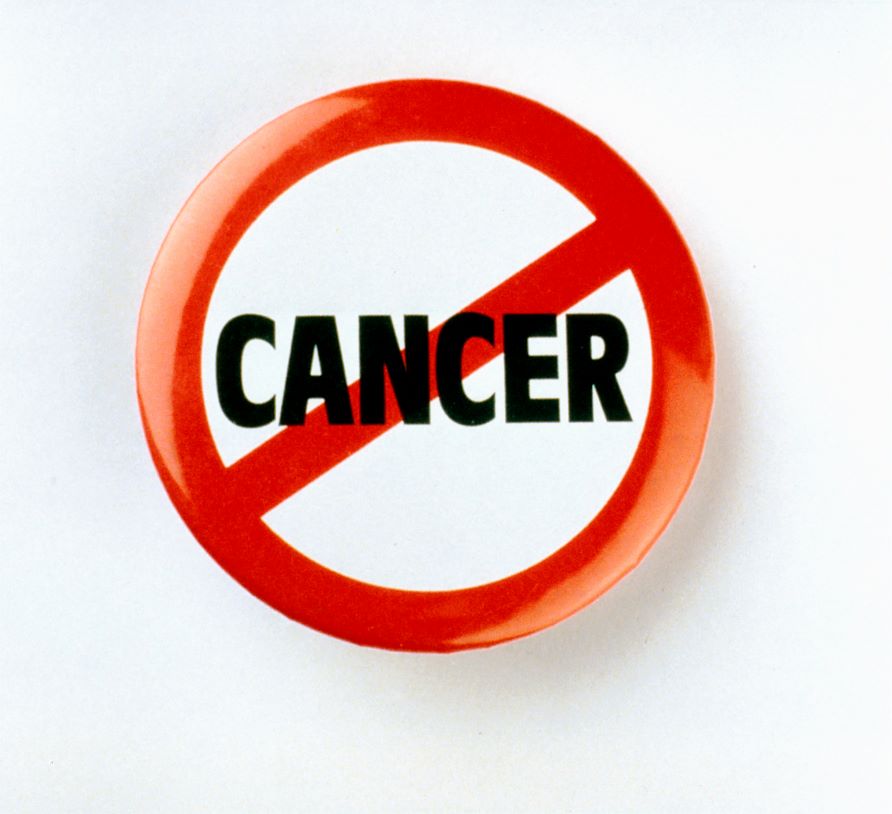
Understanding BPH
An enlarged prostate is also referred to as benign prostatic hyperplasia, because it growth of the prostate gland results from non-cancerous causes.
However, while the condition is benign, it is not harmless. In fact, many men with BPH experience uncomfortable symptoms affecting the lower urinary tract, leading them to seek relief through lifestyle interventions, medication, surgery or minimally invasive procedures like prostatic artery embolization in Georgia.
Can an enlarged prostate mean cancer?
The National Cancer Institute, explains that BPH symptoms such as the urgent need to pass urine, waking up at night to urinate, or dealing with reduced urinary can mimic those of prostate cancer. However, while it is possible to have both conditions at the same time, simply having BPH does not increase your risk for prostate cancer.
In spite of this fact, men who suffer from an enlarged prostate often experience severe symptoms that take a serious toll on quality of life. What's more? If you treat BPH and relieve your symptoms, you could ain clarity about additional health concerns that could be hiding behind your enlarged prostate.
Ready to relieve intrusive BPH symptoms without surgery or overnight hospital stays? Click here to request an appointment at the Georgia Prostate Institute. Together, we can decide if PAE in Georgia is your best pathway to relief!
Diet plays a crucial role in managing an enlarged prostate (benign prostatic hyperplasia or BPH). Certain foods might worsen symptoms or contribute to prostate enlargement.
An enlarged prostate diet emphasizes consuming more fruits, vegetables, and fiber-rich foods while reducing items that can exacerbate symptoms. Professional advice is crucial for personalized dietary recommendations.
Dietary adjustments focusing on nutrient-rich foods while limiting those that can worsen symptoms may positively impact prostate health.
If you or a loved one are living with an enlarged prostate, your diet is vital to your overall health. Continue reading to learn about important prostate diet tips, including ten foods to avoid with BPH below.

The Ten Worst Foods for Prostate Health
Maintaining prostate health involves making informed dietary choices. Certain foods may worsen prostate-related symptoms or contribute to prostate enlargement.
Here are ten foods to avoid if you have an enlarged prostate:
- Red Meat: High consumption of red meat, particularly processed meats, may negatively impact prostate health.
- Dairy Products: Excessive dairy intake, especially high-fat options, might affect prostate health.
- Caffeine: Overconsumption of caffeine from coffee, tea, or energy drinks could irritate the bladder, worsening urinary symptoms related to an enlarged prostate.
- Alcohol: Excessive consumption of beer and spirits can irritate the bladder, exacerbating urinary symptoms associated with an enlarged prostate.
- Spicy Foods: Spicy meals and excessive spices might aggravate the urinary tract, potentially worsening symptoms.
- High-Sodium Foods: Foods rich in sodium, like processed or canned items, could lead to fluid retention, impacting urinary function.
- Sugar and Artificial Sweeteners: Too much sugar and artificial sweeteners may contribute to inflammation, affecting prostate health.
- High Oxalate Foods: Items high in oxalates, such as spinach and nuts, could increase the risk of kidney stones, affecting urinary flow.
- Fried Foods: Foods high in fat or fried in oil might negatively impact overall health and worsen prostate symptoms.
- Saturated Fats: Foods containing saturated fats, such as fast food or certain oils, might impact prostate health and should be consumed in moderation.
Understanding the impact of these foods can assist in making dietary adjustments for better prostate health. Always seek professional guidance for personalized nutritional recommendations.
A Sample Diet for Enlarged Prostate
Creating a diet that supports prostate health involves incorporating beneficial foods while avoiding those that may exacerbate symptoms. Here's a sample meal plan:
Breakfast
- Oatmeal: Rich in fiber, oats can help regulate bowel movements and promote digestive health.
- Berries: Blueberries, strawberries, or raspberries offer antioxidants that benefit overall health.
- Almonds: A handful of almonds provides healthy fats and nutrients.
Mid-Morning Snack Options
- Greek Yogurt: Low-fat Greek yogurt contains probiotics and protein beneficial for gut health.
- Mixed Nuts: A handful of mixed nuts, such as almonds, walnuts, or pistachios, provides healthy fats and nutrients for overall health.
- Fruit Smoothie: Blend mixed berries, a banana, low-fat yogurt, and a splash of almond milk for a refreshing and nutritious mid-morning snack packed with vitamins and antioxidants.
Lunch
- Salmon: High in omega-3 fatty acids, salmon supports heart and prostate health.
- Leafy Greens: Spinach, kale, or Swiss chard offer vitamins and antioxidants.
- Brown Rice: A serving of brown rice provides fiber and essential nutrients.
Afternoon Snack Options
- Carrots and Hummus: Carrots offer beta-carotene, while hummus provides protein and healthy fats.
- Celery with Peanut Butter: Crunchy celery and peanut butter offers a satisfying snack rich in fiber, protein, and healthy fats.
- Whole Grain Crackers with Cottage Cheese: Whole grain crackers served with cottage cheese balance protein and carbohydrates, promoting a feeling of fullness, and offering essential nutrients.
Dinner
- Grilled Chicken Breast: Lean protein from chicken supports muscle health.
- Quinoa: A nutritious grain rich in protein and fiber.
- Steamed Broccoli: Provides vitamins, antioxidants, and fiber.
Evening Snack Options
- Apple Slices with Peanut Butter: Apples offer fiber, while peanut butter provides protein and healthy fats.
- Yogurt Parfait: Layer low-fat yogurt with granola and fresh berries for a delightful and nutritious evening snack rich in probiotics, fiber, and antioxidants.
- Rice Cakes with Avocado: Top rice cakes with sliced avocado for a simple and satisfying snack providing healthy fats and essential nutrients.
Always consult with a healthcare professional before starting a new diet to ensure the foods you plan to consume are beneficial to your health.
Tips for an Enlarged Prostate Diet
Creating a well-balanced diet with nutrient-rich foods can improve prostate health and overall well-being. Along with your PAE treatment, we encourage you to:
- Drink plenty of water throughout the day to maintain urinary health.
- Reduce consumption to minimize bladder irritation.
- Control portion sizes and avoid overeating.
- Seek advice from a healthcare professional or a nutritionist for personalized dietary recommendations.
Learn How to Reduce Prostate Enlargement with Diet in Georgia
Discovering the right dietary approach for managing an enlarged prostate is a crucial step toward promoting prostate health.
You can positively impact your well-being by making informed food choices and adopting a balanced diet.
For personalized guidance and further insights into reducing prostate enlargement through diet, reach out to our team at Georgia Prostate Institute in Atlanta. Our experts are here to provide comprehensive support and tailored advice for better prostate health. We also offer non-surgical prostate treatment in Atlanta.
Contact us today to learn more and take proactive steps toward a healthier lifestyle.
Supplements have garnered attention as potential ways to improve prostate health. They aren't meant to replace medical advice or specialized treatment but rather supplement a healthy lifestyle.
If you or a loved one are hoping to improve your prostate health due to an enlarged prostate or any other diagnosis, know that you're not alone in this journey.
At Georgia Prostate Institute in Atlanta, our dedicated team recognizes the significance of prostate health and understands the complexities that come with managing conditions like an enlarged prostate (Benign Prostatic Hyperplasia or BPH).
We're committed to providing comprehensive guidance and support tailored to your unique health needs. If you're navigating concerns about your prostate health, our team is here to help you embark on a proactive path toward improved well-being and prostate health.
Continue reading to learn more about how some supplements may help with overall prostate health but remember that before incorporating any supplement into your routine, consulting a healthcare professional is crucial.

Should I Take Supplements for Prostate Health Improvement?
The short answer is “possibly.”
Deciding to take supplements for prostate health is something you should talk about with your prostate doctor. At Georgia Prostate Institute, our team of providers offer a non-surgical prostate treatment in Atlanta and can help you understand if supplements might be good for you.
What are the Best Supplements for Prostate Health?
Understanding the best supplements for prostate health can help you decide if specific options suit you. Let's explore some natural supplements for prostate health below.
Saw Palmetto for Prostate
Saw palmetto, derived from a palm tree native to the southeastern United States, is one of the most popular herbal supplements for prostate health. Its extract is renowned for possibly alleviating symptoms of an enlarged prostate, including difficulties with starting urination, weak urine flow, and frequent urination, especially at night.
Beta-Sitosterol for Prostate
Beta-sitosterol, a plant-derived compound found in various foods, has emerged as a supplement potentially beneficial for prostate health. Some studies indicate its potential to alleviate BPH symptoms, especially in promoting urinary flow and diminishing residual urine volume.
Pygeum For Enlarged Prostate
Pygeum, derived from the African cherry tree's bark, has been traditionally used to alleviate urinary symptoms related to an enlarged prostate. It contains compounds that reduce inflammation, help reduce nighttime urination frequency, and enhance urine flow.
Explore Supplements for an Enlarged Prostate in Georgia
Your prostate health is our top priority at Georgia Prostate Institute in Atlanta.
From offering expert advice on the best supplements for prostate health to recommending and completing minimally-invasive prostate treatment, including prostate artery embolization.
To learn more about the potential benefits of prostate supplements or to get help for enlarged prostate symptoms, we encourage you to contact us today.
Men with benign prostatic hyperplasia (BPH) often seek relief, so they want to shrink an enlarged prostate natural. Now, if you only wish to manage your symptoms of BPH, you can follow lifestyle changes (highlighted below). However, if you actually wish to reduce the size of the enlarged gland, medical interventions will be necessary. Let's explore your options, together, in this post.
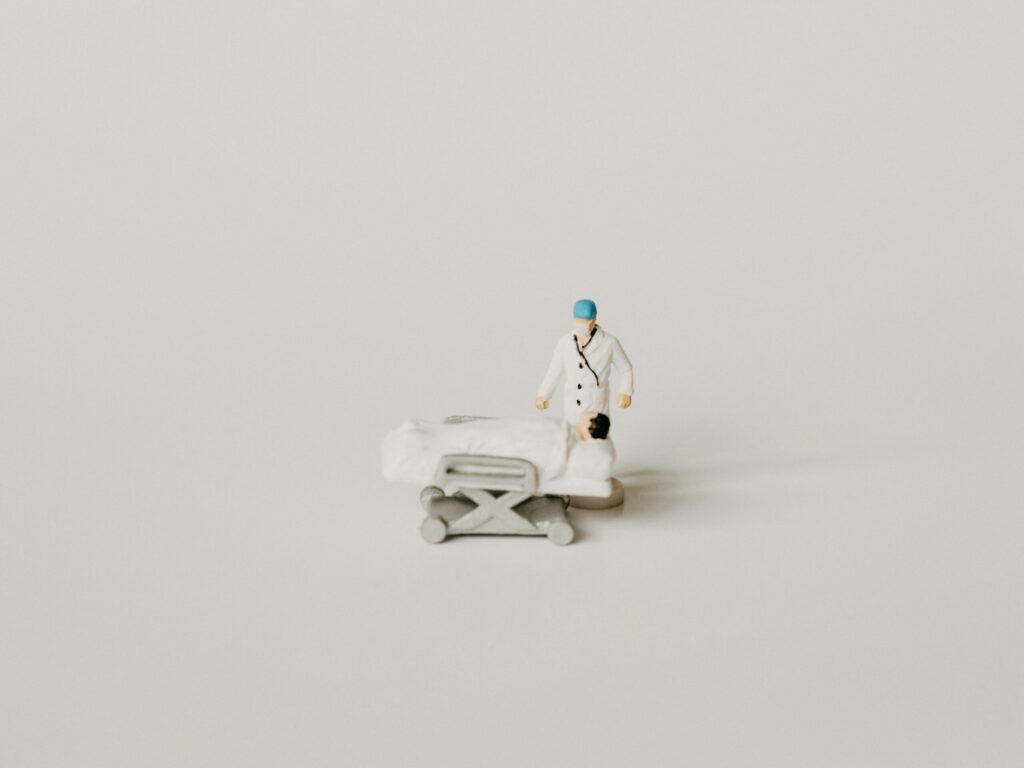
Can you Shrink an Enlarged Prostate Naturally?
Only medical intervention will shrink an enlarged prostate. However, there are some lifestyle changes you can make if you want to simply manage some of your disruptive symptoms. (Including urinary frequency, dribbling at the end of a pee, and struggling to start the flow of urine). Even without shrinking your prostate, these lifestyle changes can improve your quality of life.
To help relieve BPH symptoms, you can:
- Avoid drinking for several hours before going to sleep
- Limit caffeine and alcohol intake, since both are diuretics
- Adopt a diet low in fat, but high in fruits and vegetables
- Engage in daily mild to moderate physical activity
- Reach and maintain a healthy weight
Of course, these lifestyle swaps won't reduce the size of a prostate gland that's become enlarged. However, because they can significantly improve your symptom burden, many men consider natural treatment options to be their first line of defense against BPH symptoms.
When to Ask for Help
If lifestyle measures, medications, or other less invasive treatment options can't relieve your BPH symptoms, you can shrink an enlarged prostate with minimally invasive PAE (prostatic artery embolization). When we perform this procedure at the Georgia Prostate Institute, we physically shrink the prostate by cutting off blood flow to the gland. Afterward, men experience significant symptom relief without surgery, anesthesia, hospital stays or sexual side effects.
Do you want to see if you are a candidate for PAE? Our interventional radiologists in Georgia are ready to answer your questions and help you explore your options. Click here to request an appointmenttoday!






